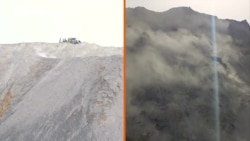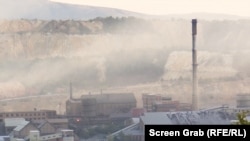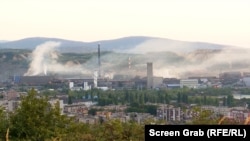Living next to the Chinese-owned Zijin mines, villagers near Bor in eastern Serbia and Panjakent in western Tajikistan face the same threat: poisoned air, degraded farmland, and no recourse. At the same time their governments deepen ties with Beijing.
As both countries embrace Chinese investment under Beijing's Belt and Road Initiative, villagers say they're paying the environmental price, allegations Zijin denies.
"That smell hits your nose, makes you dizzy. It's poison," says Asadulo Rahmonov of Khumgaron, Tajikistan.
"With this dust, it's impossible to grow anything healthy," adds Milos Bozic from Krivelj, Serbia.
Zijin operates a copper mine in Serbia and a gold mine in Tajikistan. Both sites have drawn repeated complaints from nearby residents, who say promised relocations and cleanups never materialized.
"Sell my property? What am I supposed to do -- sell my dignity?" asks Dragoslav Stanculovic, head of the local council in Ostrelj, Serbia, where most households have already left.
Zijin acquired Serbia's former state-run mining basin in 2018 and launched operations at the new and fully Chinese Cukaru Peki mine in 2021. Since then, residents and experts have warned of worsening pollution. The company says it has spent $259 million on environmental improvements, including reducing sulfur dioxide. But toxic particles remain.
"PM particles and arsenic are still present," says Snezana Serbula, a professor at Bor's Technical Faculty. "People in Bor breathe them daily."
Air-quality monitors show continued problems. "Before, you saw the smoke," says Violeta, a Bor resident. "Now it's invisible, but it smells awful."
Despite public outcry, the Serbian government has defended Zijin. By 2024, Chinese firms became Serbia's top exporters, earning over $1 billion.
"What good is money if you're losing your health?" asks Bor resident Vlada.
Activist Dejan Lazar calls it "aggressive mining," with locals left behind.
"The city was built around the mine. No one's against mining. But this is irrational," he says.
Others, like Miodrag Zivkovic, say they were pushed off their land with little recourse.
"That farmland was my livelihood," he says. "Now I live on a 200-euro pension. You tell me how."
Zijin says 98 percent of land in the area was acquired voluntarily, and remaining expropriations followed legal procedures. It insists it is developing Serbia's first "green mine" in compliance with environmental laws.
In Tajikistan, Zijin holds a 70 percent stake in the Zarafshon gold mine.
"In the morning, thick smoke covers the village," says Abutolib Mukhtorov of Shing. "You can't breathe."
Zijin has been fined multiple times but enjoys strong backing from Tajik authorities, who point to millions in tax revenue. Meanwhile, critics report police intimidation, surveillance, and detention.
Those who speak out risk retaliation. In 2023, a group of women who traveled to Panjakent to protest were detained.
"We asked what crime we committed. They mocked us," recalls Firuza Kahorova. "When I fainted, they said, 'Don't give her water; give her dirt.'"
Zijin maintains it operates legally and plans to mine in Tajikistan for another 20 years.
In both countries, authorities hail the company as a driver of economic growth, even as the environmental cost mounts.
"Peaches don't grow. Cucumber flowers fall off. The river's poisoned," says Rahmonov.
For those living in its shadow, Zijin's expansion brings not prosperity, but dust and a fight for the future.










